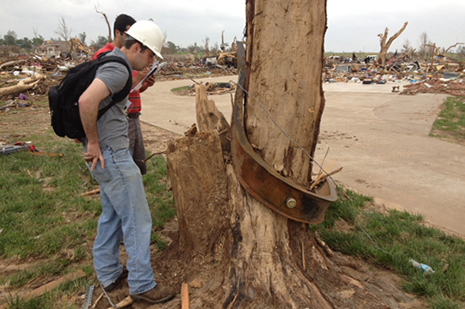Royce Floyd, who earned a doctorate in civil engineering from the University of Arkansas in 2012, works 10 miles from the spot where an EF5 tornado touched down in Moore, Okla., on May 20.
As an assistant professor of civil engineering at the University of Oklahoma, Floyd joined a team of other researchers to gather data after the disaster. The team, which is sponsored by a Rapid Response grant from the National Science Foundation, collected information about the performance of buildings in the area. This data could help the people of Moore, and other communities facing threats from tornadoes, be better prepared.
Floyd and other faculty at OU worked with researchers from the University of Alabama, the University of Florida and Mississippi State University. Floyd and his OU colleagues are analyzing lateral load-bracing systems. He explained that houses in Moore built after the 1999 tornado are required to have a solid material, like plywood or oriented strand board, surrounding the walls. Solid outer walls can transfer force from winds into the foundation of the building, whereas walls that alternate wood with a nonstructural material, such as foam insulation, are more easily damaged. The OU researchers will compare data from these two types of lateral bracing to see the effect of these regulations on the survivability of the buildings.
In areas affected by tornadoes, having robust buildings is important, but Floyd explained that communities like Moore also need concrete shelters or storm cellars. Homes and other buildings can be designed to withstand EF2 or EF3 tornadoes, but in the event of a stronger tornado, like the one that hit Moore in May, only a shelter or cellar can provide complete protection for people who live in the path of the storm. Floyd explained that protecting a community from tornadoes requires both effective construction practices and easily available shelters.
Micah Hale, associate professor of civil engineering at the University of Arkansas, was Floyd's doctoral adviser. "One of the most satisfying things about teaching is watching your students graduate and use their skills to help their communities. It's great to see former students like Royce, who is using his engineering education in the classroom and the lab, but also in a very immediate way, providing help where it is needed," said Hale.
"This was an opportunity to contribute to something that can help the people of Oklahoma," said Floyd. "To find ways to better protect the people in the state."
Contacts
Camilla Medders, Director of Communications
College of Engineering
479-575-5697,
